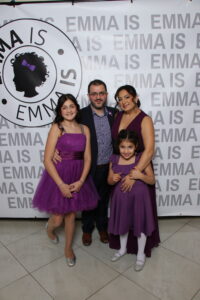Monica Diaz-Greco is a graduate of St. Michael’s College with an Hon. B.A. in 2000 and an M.RE. in 2010. She is currently completing a Master in Theological Studies degree. Monica is a seasoned educator and the mother of a child with epilepsy. She has become a tireless advocate for epilepsy awareness and support. Monica and her husband Daniel are the founders of Emma IS, a non-profit named for her daughter, Emma, which creates awareness of epilepsy and infantile spasms and raises funds for IS research.

When my daughter Emma was diagnosed with a rare form of epilepsy at just seven months old, it marked the beginning of a transformative journey for our family. Now, almost 10 years later, our story is one of resilience, triumphs, and an unwavering commitment to advocacy and awareness.
Emma’s diagnosis of Infantile Spasms, a rare form of epilepsy, came as a shock. Prior to her diagnosis, Emma was developing normally; however, every two weeks or so, she would make a strange type of movement that resembled the startle reflex. My husband and I actually laughed about it and recorded it so that one day we could show her this funny movement she used to make.
One day, Emma did the movement again, and for some reason, it didn’t sit well with me. Something seemed off. A Google search led me to a YouTube video of a child doing something very similar, with the description: “If your child does anything like this, rush them to the nearest children’s hospital. This is a medical emergency.”
After a visit with her pediatrician, we were fast-tracked for an electroencephalogram (EEG) at SickKids (the only way to determine if a child has Infantile Spasms is through an EEG). Emma was scheduled to have one the next day, but in my heart, I knew she had it. The time before her appointment was spent researching Infantile Spasms, and the results weren’t pretty. Words and phrases like cognitive delays, some children don’t walk, genetic condition and a high chance of autism stayed with me. I stopped eating and sleeping. The fear was crippling. I cried a lot. After watching a technician attach countless electrodes to Emma’s head, once the EEG was complete, we waited, not knowing what was next. When three doctors entered the room to discuss the results of her EEG and to give us her diagnosis, the air left the room. Yet even though we heard what we didn’t want to hear, this time, I didn’t cry. My first words were, “So, what’s next? What do we do now?” These questions seem to guide me in every part of my journey of being a parent to a child with epilepsy.
The guiding questions, “What’s next? What do we do now?” became our compass, steering us through the tumultuous sea of uncertainty. They guided us when my husband and I established Emma IS, a non-profit organization that spreads awareness for Infantile Spasms and raises funds for research at the Hospital for Sick Children in Toronto. They guided us when we decided that Emma should have two surgeries, with one being brain surgery. Decisions were never easy, and the weight of worry and tears accompanied each one. But through it all, we kept fighting. Emma’s journey became more than just learning how to care for her; it became an opportunity to educate others and shatter the stigma surrounding epilepsy. We quickly learned that there is much work to be done.
In 2021, we took a bold step by presenting a delegation to the Toronto Catholic District School Board to recognize Purple Day for Epilepsy Awareness. The following year, in collaboration with Epilepsy Toronto, I developed lesson plans distributed to schools, pushing for awareness of seizures and first aid treatment and understanding of people living with epilepsy. Most recently, we celebrated a significant victory in November with the passing of Motion 68 in Queen’s Park, advocating for a comprehensive epilepsy policy in Ontario schools. This is a big victory for Emma, but also for other people living with epilepsy. Motion 68 calls for school boards to train their staff on the administration of epilepsy emergency medication. Similar to the training that school staff receive on the administration of the EpiPen, they will be trained on the signs of a seizure, when emergency medication needs to be administered, but also how to administer the medication. We are happy, relieved, and grateful that people will know more about epilepsy.
While we continue our advocacy work for Infantile Spasms and epilepsy, we are always asked What’s Next? or we ask ourselves, What Do We Do Now?. We know our journey with epilepsy will continue to be a roller coaster of emotions as we navigate obstacles along the way. As caregivers, we continue to navigate the complexities of Emma’s life journey while tirelessly working to break the stigma associated with epilepsy. The road ahead may still be uncertain, but with every triumph, we find strength, resilience, and a renewed commitment to making a difference in the lives of those touched by epilepsy.
Read other InsightOut posts.
